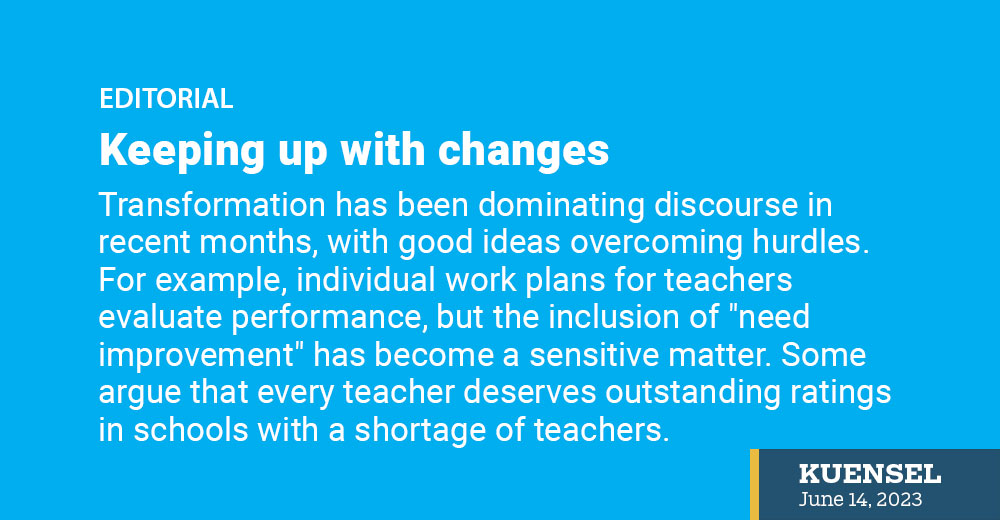The transformation or the changes in what we do and how we do, have been dominating the discourse in recent months, even if not publicly acknowledged. We are on the path of transformation and the good ideas that we are implementing are full of hurdles.
Take, for instance, the individual work plan for teachers, one form of evaluating teachers’ performance. The grievance among the teaching faculty or schools is that the mandatory inclusion of “need improvement” in teachers’ performance is unfair. Placing one or two in the category has become a sensitive matter. Some argue that in schools with an acute shortage of teachers, every teacher deserves outstanding ratings.
The issue does not solely pertain to teachers. Changes are happening across all government and public sectors. It is a significant change, and it is deliberate. It marks a departure from the past when performance was assessed based on personal connections or favoritism. The change is welcomed and appreciated.
Reforms will inevitably have an impact. We need time and experience to figure out how to navigate them. The way we are currently implementing them is merely to meet the requirements. If that is the case, it will not benefit anyone. For instance, a teacher who left for Australia months ago called her boss to ask why she was placed in the “need improvement” category. A health official helped his boss by volunteering to be in that category because his contract was coming to an end, and he was retiring. The purpose of performance rating was defeated.
There are likely many similar stories. These arise from an inability to embrace change or make difficult decisions. With the pressure to change in companies that are expected to contribute revenue to the depleting government coffers, the requirements are the same. Some employees will need improvement, some will have to be dismissed, some will be put under observation, and some will receive outstanding rankings.
While change is imperative, it takes time to understand the motive behind it. In a division of 10 employees, for instance, we should have the courage to confront and justify the scores or rankings we assign. It should gradually permeate.
One positive change recommended by the pay commission when proposing pay revisions was the implementation of competency-based incentives instead of relying solely on seniority. Protecting seniority has been the biggest problem in our system, even if it discourages young professionals or high performers.
Incentivising performers should replace seniority. It is not that we are unaware of it. In the past, when monks lined up for prayers at the grand Kunrey hall based on seniority (number of years), younger monks would ask the seniors to move up. This remark was meant in jest. With no space to move, senior monks would reprimand younger monks for lack of space.
Young monks would respond by suggesting that they move to Phajoding, indirectly telling them to retire and devote their lives to prayers. This anecdote remains relevant in 21st-century Bhutan, which is undergoing a drastic transformation.


